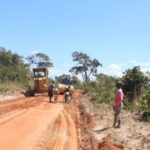O By NATION REPORTER
ZAMBIA NGO WASH Forum Coordinator Bubala Mumba has saluted Kasenengwa Member of Parliament Philemon Twasa for actualizing a weir dam project following a climate adaptation training of lawmakers in December 2024.
Speaking when she toured the dam in Kasenengwa, Ms Mumba said the Kasenengwa project was chosen as a model because it demonstrated how local resources and personal initiative could be harnessed for climate adaptation and mitigation.
She explained that the use of local and personal resources by the Member of Parliament, in collaboration with the community, made the initiative especially compelling.
Ms Mumba noted that the project showcases Zambia’s ability to translate national climate strategies into practical, on-the-ground interventions.
She emphasized that, like many other countries, Zambia faces growing water stress due to climate change — including prolonged droughts and unpredictable rainfall.
Ms Mumba said the dam project provides reliable water access for agriculture, domestic use, and livelihoods, directly addressing climate impacts.
The Forum Coordinator stated that the initiative is not merely about water storage, but also represents an integrated water resource management approach that links agriculture, health, and income.
She stated that this kind of integrated strategy aligns closely with the holistic nature of climate resilience and promotes best practices.
Ms Mumba also pointed out that significant community participation makes the project effective, showing how local knowledge and needs have shaped the initiative.
She said the project strengthens Zambia’s efforts to integrate climate resilience into the WASH sector by improving water availability, reducing vulnerability to climate shocks, and creating sustainable water access even during dry periods.
Meanwhile, Kasenengwa Member of Parliament Philemon Twasa said the site was located in Kasenengwa’s Makungwa Ward, surrounded by four villages namely Fisheni, Thawete, Kushangeni, and Gone.
He explained that the water point served all four villages and used to be a dry spring shortly after the rainy season, with water flowing downstream during heavy rains.
Mr Twasa mentioned that, in response to the challenges of climate change, they launched the water harvesting initiative.
He noted that the motivation came after attending a climate adaptation workshop in December 2024 at the InterContinental Hotel in Lusaka, facilitated by the Water Voices United project implemented by SNV and Zambia NGO WASH Forum, Co-funded by the European Union and the Danish People’s Aid.
The Lawmaker said the training made him realize such initiatives were achievable, prompting him to engage traditional leaders and community members to implement what he had learned.
Mr Twasa said they surveyed from about two kilometers upstream to the current site, which was found suitable for water harvesting.
The lawmaker added that this led to the creation of what the community refers to as weir dam, a rational water harvesting system.
He stated that the results had been remarkable, with a consistent water collection system replacing the formerly dry stream.
Mr Twasa said that before the initiative, the stream would dry by July or August, and livestock farmers had to walk up to 10 kilometers for water.
He explained that now the distance was reduced to half a kilometer, which had significantly cut down the time and effort required.
He stressed the impact on children, who previously spent long hours fetching water, disrupting school and other activities.
According to Mr Twasa, youth teams could now concentrate on education, and more community members were considering investing in livestock and agriculture.
He mentioned that traditional leaders and other members supported the construction from the beginning, and the water resource had remained stable even through the dry season.









